"Cijepise.hr is the Culmination of Bad State Software, but Now They are Endangering Our Lives"
April 25, 2021 - Mia Biberović explains everything wrong with the Ministry of Health's vaccination platform cijepise.hr.
Mia Biberović's thoughts on Netokracija.com translated in English below:
It’s one thing when harmful software or a user experience with it makes you go to the counter after all, even though you didn’t plan to, and it’s another when it prevents those interested from getting vaccinated. At the height of the worst wave of the pandemic.
"The Ministry acknowledged the total disintegration of Cijepisi: Out of 160,000 applicants, 5,358 were invited," is the title of the article I just opened. Unfortunately, as expected, since the registration portal for those interested in coronavirus vaccination went live, everything has gone wrong. The first, test version, for which it is not yet clear why it was available to the public at all, other than it looked rather lousy, made a whole mess with those who applied during that test period.
For days, weeks, it was not clear in what order the vaccinated applicants were invited, only to realize now that there was an error with the first few hundred applicants (although thousands were initially talked about) - and they could not even be invited because their data was incomplete. And they could not be complete because it was impossible to fill in all the data in the test phase.
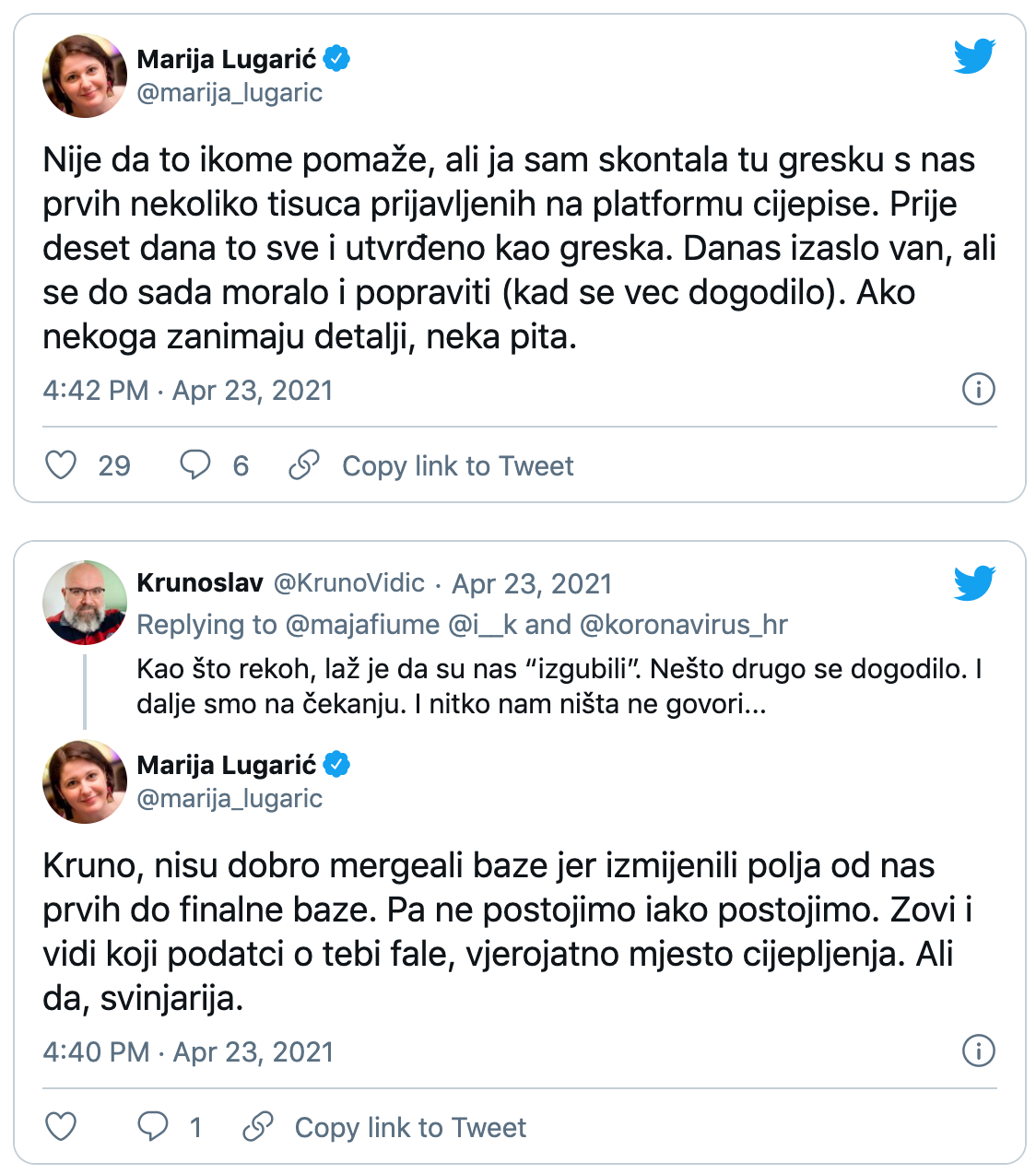
Although it was reported that all applicants in the test phase of the portal were reported successfully, in practice, this was clearly not the case.
But this is not the only problem with the portal. Due to a series of omissions, the City of Zagreb and other counties simply stopped using it without anyone informing the citizens about it. At the insistence of journalists, information was finally reached: "If you have applied for vaccination, register through your doctor."
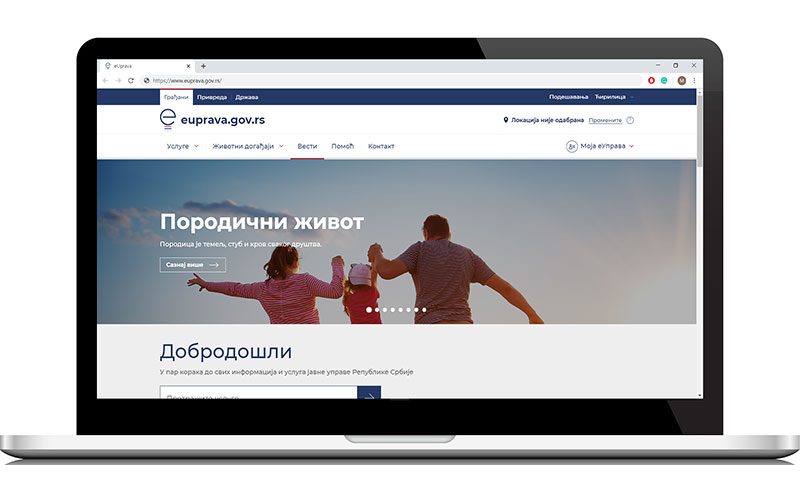
This puts us back at least a few months. In January, I wrote that in our country, the interest in vaccination is expressed exclusively by contacting a family doctor, while in neighboring Serbia, everything was done through a simple e-government portal which, unlike ours put into use two months later, really worked.
It was as if the pandemic had been raging for a year until then and as if it could not have been assumed that vaccination would need to be arranged at some point.
But this chaos is just the culmination of bad software that should be at the service of citizens. So far, we have experienced the working hours of electronic services, endless loops in them, poor instructions and user experience, the inability to work on different operating systems. But the big difference is that because of bad software, you have to dust off Internet Explorer, because public services especially like that browser. Mac and Linux users can forget about using services or that they have to take an unplanned walk to the counter because something is held up in the process. And due to bad software, user experience, and process, more people are killed than they should because they didn't get vaccinated on time.
2013 is the year. For the first time, e-Citizens are being talked about more seriously, and a year later, they will really introduce themselves. It seemed revolutionary for Croatia to receive information from the state to the civil mailbox via the Internet and gain insight into all the information that the state has about us.
There were problems with their usability and user experience, but at the same time, the project received international acclaim. We were quite critical of it in the beginning because we expected a lot. Aside from a very slowly growing number of services, we haven’t gotten much so far, and sometimes it took the perseverance of a horse to make the system work.
Usability, what is it?
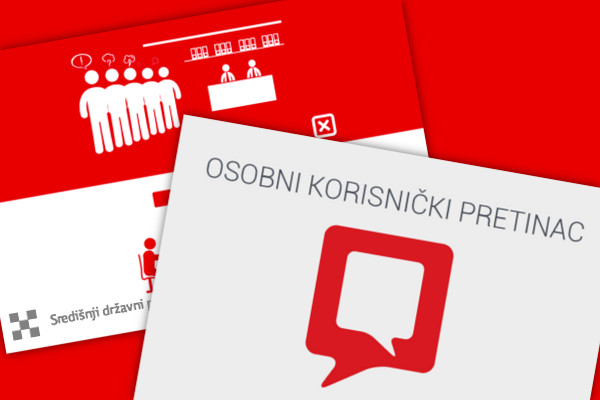
The first step where such services had issues was at the very beginning of use. Little attention was paid to usability, if at all. I remember asking a question about it at a press event to get the answer that no funds were allocated for user testing of the service.
But there were plans to work on it. Six years ago. Meanwhile, due to complicated instructions (regularly on a series of pages, in PDF), citizens began to develop their own instructions.
User tests were performed on live users. Then it was discovered that one line in the mother's last name can make it quite challenging to access the eNewborn system, necessary for "registering" a child or that the e-mail address with which eVozačke communicates with you is not the e-mail address you you need to communicate with the service.
(By the way, e-Citizens will soon receive a redesign and a different approach to the service development, so we will certainly closely monitor what will happen there.)
Open data must be machine-readable?
One year after e-Citizens, the open data portal, data.gov.hr, the central data repository of public administration bodies, was presented. In addition to increasing transparency, the goal was to create commercial projects with the help of open, machine-readable data, i.e., for developers to create applications with the help of data that citizens would use.
✅?Otvoreni podaci važni su za ekonomski rast, konkurentnost, inovacije, stvaranje radnih mjesta i društveni razvoj u cjelini. #SDURDD uspješno provodi projekt unaprjeđenja nacionalnog Portala otvorenih podataka
— SDU za razvoj digitalnog društva (@rddgovhr) February 4, 2021
Više na ➡️ https://t.co/Mo10UW1r9Z pic.twitter.com/aA9RTYUuTX
Today, we are still debating what machine-readable forms are and why they are needed. The Central State Office for the Development of the Digital Society in the above tweet boasts a flyer project featuring five, six-year-old applications, some of which don't even work anymore - because there are no newer ones, at least not on the portal!
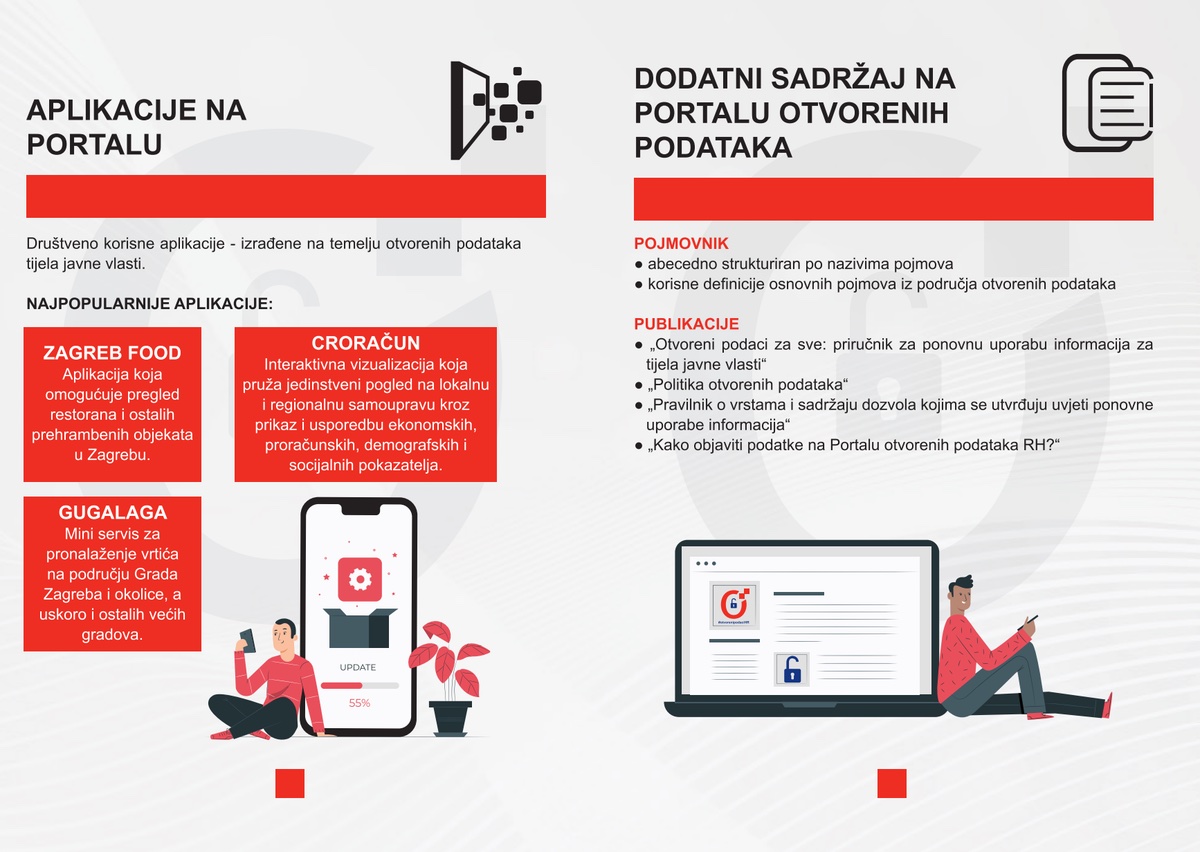
One certificate each week

Certificate illogicalities could be talked about until tomorrow, such as that it is not feasible to use some public services without a FINA certificate, which is charged extra. However, they should also be accessed using an e-ID card (just try to use e-Auctions ).
Simply put, with an ID card, we should access all public services and authorize all actions. Still, then it happens conveniently that FINA certificates are prescribed by law (fiscalization) or the use of an ID card for business purposes is prevented, even if the person is authorized to represent a company (in e-Tax, this was well resolved, but the entry of data in the Register of beneficial owners could be done online only with the help of a FINA business certificate).
Software that has working hours?
Although the e-tax service is actually a bright spot in this story, it used to be illogical. Some services had working hours.
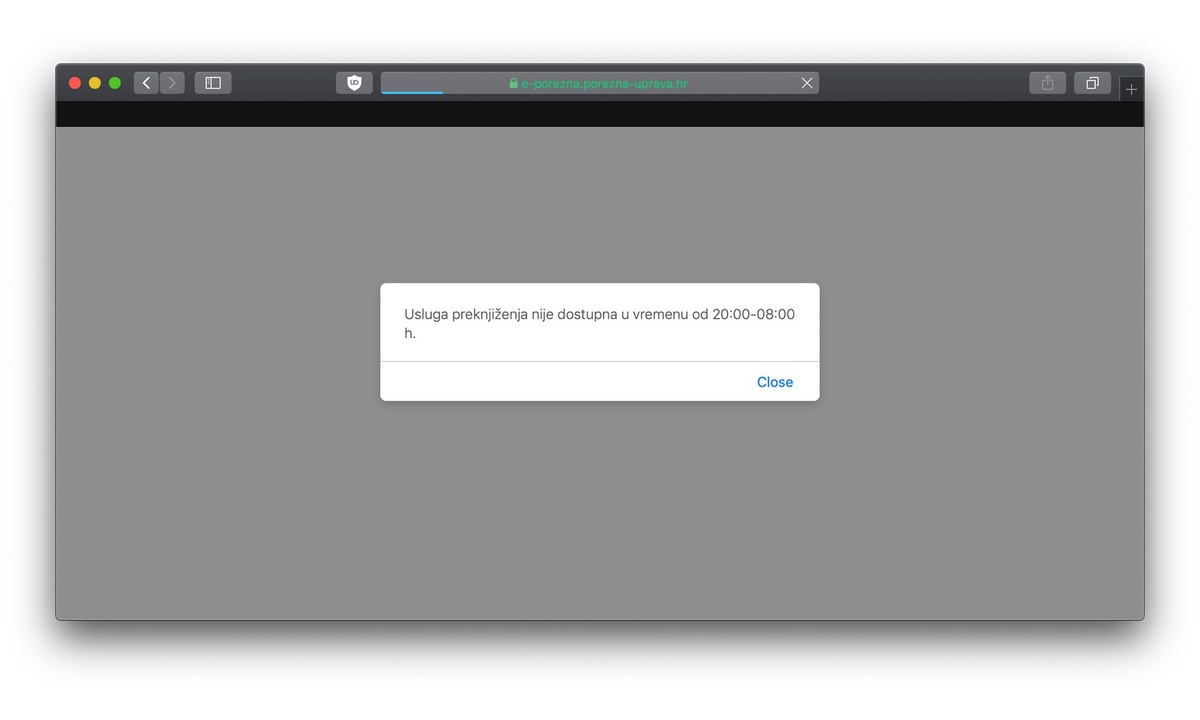
I believe there is some logic behind such a decision, but the point of online services is that they are available.
Except when they're not.
There may not be working hours, but the e-Communication legal service, which serves to communicate with the courts, is sometimes impossible to access, although various credentials are received here.
Namely, as I found out, the service was introduced last year as an obligation to communicate with courts for legal entities, state bodies, notaries, lawyers, interpreters, experts, and others. Still, the system has such frequent failures that communication with courts turns into non-communication.
Also, I found out that outside working hours, it doesn't make much sense to report a malfunction - the answers only arrive during working hours, so that although there are no official working hours, there is no troubleshooting outside of it. And failures, at least official ones, are not a small number.
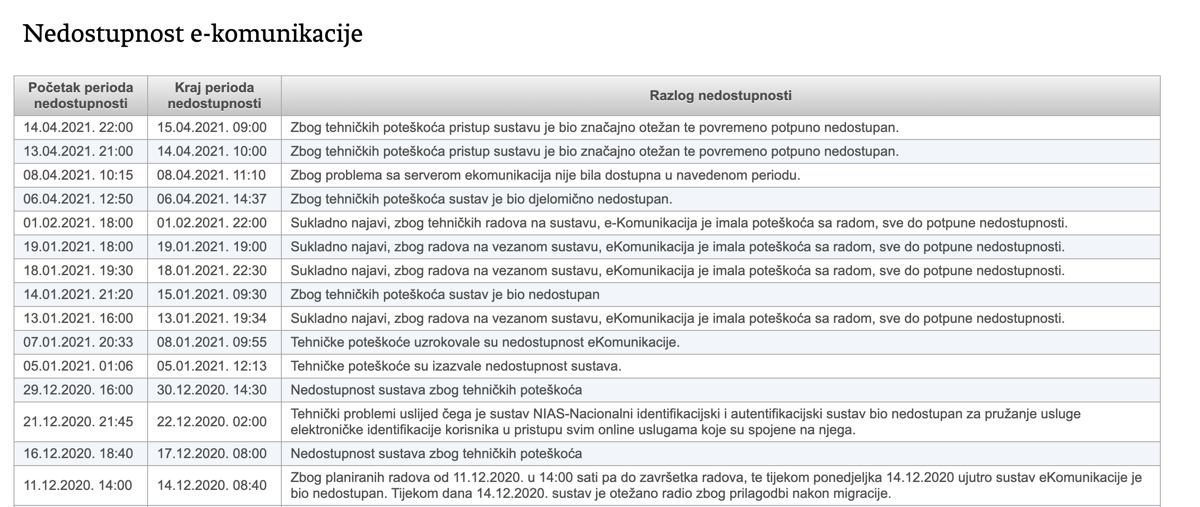
When it falls, then it really falls.
One incident from 2017 revealed that the backup of data from the register of associations did not go exactly according to the plan and schedule. Part of the data in the register of associations was lost and had to be entered manually.
And another 2020 incident revealed to us that emergency numbers depend on just one telecom. If it experiences a system crash, there are no emergency numbers.
Which, you have to admit, is pretty inconvenient.
Communication? If we really have to...?

When the gov.hr portal, which was presented at the same time as e-Citizens, was criticized, a response came from the Government that explained a lot, whether they agreed with it or not. I sincerely hoped for a similar reaction from the authorities when I wrote about communication around the vaccine before the coronavirus pandemic was a topic. We received silence and confirmation that we do not know, do not want to, cannot communicate.
Private initiatives often fill in the gaps.
From floods to earthquakes to pandemics, nature has not spared us in recent years. Private initiatives have helped the chaos that has arisen on the ground and the multitude of information and misinformation.
This is how the poplave.hr service was created after the earthquake services such as the Petrinja Earthquake or the 2020 Earthquake were made, and koronavirus.hr during the pandemic.
Often these initiatives survive as much as the enthusiasm of individuals, and the state does not recognize them, but that has changed in the case of the Koronavirus.hr service. It became a central place of communication about the then still new virus, unlike the previous situation where information was fragmented and often incomplete.
Of course, this raised the question of procedure - was such a deal allowed to be concluded without a tender?
But should we especially point out that tenders bring us florists in charge of creating software?

When it comes to private initiatives, I can't miss the Viber group that offered timely information to foreigners who, despite the situation with COVID-19, wanted to visit Croatia last summer. However, instead of the group being led by the Croatian National Tourist Board or the Ministry of Tourism, it was led by Paul Bradbury, Krešimir Macan, and several interns.
(Bradbury was served a lawsuit after all, so I'm not sure he's going to deal with bringing tourists to Croatia this tourist season, as the tourist board has sued him).
Everything is possible when the cash register needs to be filled…?
Finally, I have to share one very positive experience with public services - e-Violations. I had the honor of recently paying a fine through that service, and everything went flawlessly. When it comes to something that fills the piggy bank, it obviously can!
It's not funny.
For the first of April, I wrote a joke that a man from Zagreb registered through the cijepise.hr portal received helpful feedback immediately and was in line for vaccination in two days. I described the application process to the Serbian version of the portal. Still, I fantasized that the databases were well connected, so doctors were immediately informed about which of their patients had been vaccinated.
Instead of laughing, all I feel is anger, helplessness, despair. I believe that many other citizens feel similarly, watching in recent days as the tangle around the disorganization of vaccination is unraveling. All that needed to be done was a good, simple service, to communicate clearly with the citizens, and to give timely information.
That mission is impossible, of course, if our code is knitted and arranged by florists, but it would be too easy to blame them. The problem with the software that should serve the citizens is older than the software itself and will not be solved so easily!
For more on coronavirus specific to Croatia, including travel, border and quarantine rules, as well as the locations of vaccination points and testing centres across the country, make sure to bookmark our dedicated COVID-19 section.
As Cijepi Se Website Fails, Plan for Zagreb Vaccination Revealed
April the 25th, 2021 - As we previously reported, the once popular cijepi se vaccination platform has completely failed and will no longer be an option for those wanting to be vaccinated against the novel coronavirus. What are the next steps for the Zagreb vaccination process?
As Poslovni Dnevnik writes, as Zvonimir Sostar, the head of the Dr. Andrija Stampar Institute recently confirmed to Index, vaccination through the Cijepi se system has been stopped by the City of Zagreb and the capital no longer intends to continue it in future through the platform.
"That's right, only those who have applied through their family doctors are being vaccinated. We're no longer vaccinating people through the Cijepi se platform at all,'' said Sostar yesterday morning. He also explained the reasons behind such a decision.
"When we had a meeting with the IT specialists, we asked them if the platform is working properly anywhere, in any county. The answer was that no, it wasn't working at all. Then we decided entirely on the model that health centres actually carry out the vaccinations, and that we be the coordinators and the logistics behind that. Family doctors refer people, and the order goes through. This way of doing it is successful and it works extraordinarily well, the response is very good,'' said Sostar of the Zagreb vaccination plan going forward.
“We're going to continue as we have done so far, through people's general practitioners. Until further notice, we're not going to be taking vaccine registrations through the Cijepi se platform,''
He warned of a major technical problem with the website, which is one of the key reasons why they gave up using the platform. "The platform now only shows the initials, which creates big problems for us. You can't check the vaccination status with the initials, we have to do the checks, all of which requires extra time,'' according to Sostar.
Sostar revealed plans for the Zagreb vaccination process in the weeks ahead.
"We plan to vaccinate people next week as well as this week, which means that there aren't going to be any vaccinations on Monday mornings and on Friday afternoons. The main reason is that we still don’t have enough vaccines to vaccinate people for hours on end. But that week after the next we plan to provide vaccinations on both Monday morning and on Friday night, as well as on Saturday, at least in the mornings.
As of that week, we estimate that we'll vaccinate about 6,500 people a day. The news is that we're introducing three additional teams at the Zagreb Fair. We're going to vaccinate with AstraZeneca on Monday and Tuesday, and since we should receive 18,000 doses of Pfizer on Monday, that should be enough for us to start vaccinating with Pfizer on Wednesday, Thursday and Friday. Next week, we should receive 3,500 doses of Moderna and 1,350 doses of Johnson & Johnson,'' Sostar told Index.
For more on coronavirus specific to Croatia, including travel, border and quarantine rules, as well as the locations of vaccination points and testing centres across the country, make sure to bookmark our dedicated COVID-19 section.
Cijepise.hr Website Breakdown: Very Low Number of Registered Citizens Vaccinated
April 24, 2021 - Due to several errors on the Cijepise.hr website, county bureaus have given up calling citizens registered through the national platform.
The multi-million kunaa Ministry of Health platform Cijepise.zdravlje.hr, which was pompously put into operation in February and which saw tens of thousands of citizens apply for vaccination, has utterly failed.
As Jutarnji List learned from the county institutes of public health, in most counties, no one was able to get vaccinated after registering on the platform, and those counties that tried to use it gave up because the system was unclear and full of errors, which created clutter and chaos on the ground.
At the largest mass vaccination point in the country, the Zagreb Fair, only citizens ordered by family doctors through the CEZIH ordering system were vaccinated this week. The Teaching Institute for Public Health "Dr. Andrija Štampar" says that they decided to do so after the experience from previous weeks when they tried to implement and report from the platform. Still, the response of those invited from the platform was extremely low - from 20 to a maximum of 50 percent, due to which their numerous deadlines remained unfilled.
There are probably more reasons for this. There is a shorter call time, the development of information about side effects with certain vaccines, and even technical challenges such as emails being classified as 'Promotions' for Google mail clients, they explain. They used to receive the registered call late in the evening with the notification that they have a vaccination date at 8 am, so they would see the email a few hours after their appointment had already passed.
After the arrival of Pfizer and the need to raise the reliability of those invited to a higher level, this week, Zagreb exclusively chose the family doctor channel for vaccinations.
"This has successfully raised the capacity to about 4,500 citizens per day," they said.
They add that so far, a total of more than 30,000 people have been vaccinated at the Fair, of which about 7,000 (23%) through the platform. They also tried to use the Cijepise.hr platform in Varaždin. Still, as Marin Bosilj, the director of the Varaždin Institute, revealed, they experienced an incredible mess that they do not want to repeat.
"On the day of vaccination, they subsequently sent us people, without their full names, only initials. So we controlled the OIB at the checkpoints and slowed down the whole process. Also, it was not clearly indicated to the people that they had first just registered them as interested and that they would only be given an appointment later. That is why, when the checkpoint opened, everyone enrolled came. Chaos," he points out and adds that in such a confusion, only about 500 people ordered through the platform were vaccinated at two points in three terms. All the others, 3,900 of them vaccinated at checkpoints, were given an appointment through a family doctor.
"We have opened the office access to the national electronic platform. The institute opens an appointment, doctors, who are familiar with the technology, enroll in any other examination. The number of patients per doctor is limited so that those younger and more computer-savvy would not get more appointments than others with the fastest finger system. When the appointments are filled, we close the calendar, and further orders are not possible. All the data have already been entered, and it is enough to come to the checkpoint only with a confirmation," said the expert of the Institute of Information Technology Vedran Klarić.
"In Istria, we do not use the state platform, and we have not used it. We are still vaccinating the priority group - the chronically ill and those over 65 years of age. That is why vaccination through that platform is not a topic for us yet," says Ante Ivančić from the Istrian health center. For now, in the County of Istria, all those who want to be vaccinated are sent from their doctors.
The director of the Vukovar-Srijem County Public Health Institute, Dr. Kata Krešić, said that so far, they have not needed to use the platform at all.
"We didn't even have enough vaccines to use the platform. All vaccinations that have been performed so far have been in family medicine, and at the checkpoints, it was organized for people who were reported and referred by their family doctors," says Dr. Krešić.
Only 1,500 citizens of Karlovac County applied for vaccination through the Cijepise.zdravlje.hr platform, a rather small number of 22,450 people vaccinated so far, i.e., vaccines distributed. The director of the Karlovac County Public Health Institute, Branko Zoretić, emphasizes that a good part of that number has already been vaccinated because they are on the lists of their family doctor.
Jutarnji also asked the Ministry of Health for comments and data on several occasions. On Friday, we were told that the answer was "related to the topic of vaccinations and platforms in the work of professional services."
For more on coronavirus specific to Croatia, including travel, border, and quarantine rules, as well as the locations of vaccination points and testing centres up and down the country, make sure to bookmark our dedicated COVID-19 section.


